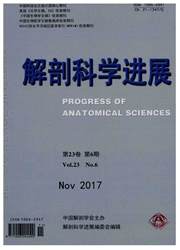

 中文摘要:
中文摘要:
目的用去甲基化药物5-Aza-d C处理雌激素受体α(estrogen receptorα,ERα)启动子甲基化的乳腺癌细胞系,探讨ERα启动子甲基化与MTA1在乳腺癌发生发展中的可能机制。方法用去甲基化药物5-Aza-d C逆转MDA-MB-231和MDA-MB-435s的ERα启动子甲基化,甲基化PCR验证其甲基化状态,用RT-PCR和Western blot研究去甲基化后MTA1 m RNA和蛋白表达情况,Transwell检测去甲基化后细胞侵袭能力的改变。结果在MDA-MB-231和MDA-MB-435s细胞系中,去甲基化药物5-Aza-d C逆转ERα启动子甲基化后,MTA1m RNA和蛋白表达水平下调,细胞侵袭能力下降。结论乳腺癌细胞系MDA-MB-231和MDA-MB-435s中ERα甲基化与MTA1表达存在相关性。
 英文摘要:
英文摘要:
Objective To assess the correlation between the estrogen receptor α(ERα) methylation and MTA1 expression in breast cancer MDA-MB-231 and MDA-MB-435 s cell lines. Methods The demethylating agent 5-Aza-d C was used to demethylate the methylation of ERα in breast cancer cell lines MDA-MB-231 and MDA-MB-435 s. The expression of MTA1 protein and m RNA was evaluated by RT-PCR and Western blot respectively, the cancer cell invasive ability was assessed by Transwell. Results The expression levels of MTA1 protein and m RNA in MDA-MB-231 and MDA-MB-435 s were downregulated, and the invasive ability of the breast cancer cells decreased after the methylation of ERαwas reversed by demethylating agent 5-Aza-d C. Conclusion MTA1 expression in MDA-MB-231 and MDA-MB-435 s was related to ERαmethylation.
 同期刊论文项目
同期刊论文项目
 同项目期刊论文
同项目期刊论文
 期刊信息
期刊信息
